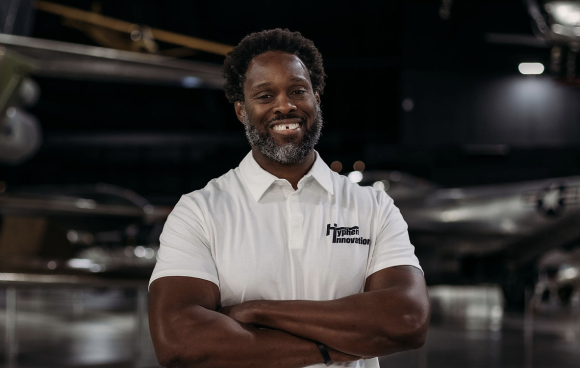Today’s podcast episode is the second half of our interview with Dr. Onome Scott-Emuakpor, the founder of Hyphen Innovations, a firm that develops low cost, damage resistant aerospace components.
When Onome does engineering research, he fuels his creativity by embracing resource constraints and what he calls the “fail fast” mentality. The fail fast mentality means you can look at failure during the problem solving process as a positive. If “failing” means you learn something that propels you forward the next time you try to solve the same problem, then it really isn’t a failure. It’s a success.
We also discussed Onome’s desire for more young African Americans to feel confident in their abilities to pursue degrees in engineering.
You can also view the podcast in video form on our YouTube Channel.
Listen with the player at the bottom of the page or at your favorite podcast app.
Facebook: https://lnkd.in/dB_nzFzt
Instagram: https://lnkd.in/dcxjzVyw
Twitter: https://lnkd.in/dDyT-c9h
Noah Graff: What does the expression “failing fast” mean to you?
Dr. Onome Scott-Emuakpor: I ask myself, what will I learn when this happens? If I decide that what I’m going to learn is healthy, it’s not failure. It’s just a prediction. You go fast, you fail, you learn something, you make it better. You go fast again.
Graff: You told me previously that you often prefer to stay in the background and observe other people from a distance. Do you see this as a positive?
Scott-Emuakpor: I think it’s a positive. I like to pay attention to the way certain things play out in the background before I make a decision. Take this entrepreneurial journey that I’m on right now.
A lot of people would say, “I want to start a business.” And they jump right into it. In my case, I went through an entrepreneur opportunity program.
I shadowed a lot of people. I called a lot of people. I had a lot of mentors. I took a year, essentially a sabbatical, going through the Air Force, understanding all the intricacies, sitting in the background, and paying attention to how things are done before I actually said, all right, I’m ready to make a move and make a decision.
Graff: Do you often consciously see yourself as an artist?
Scott-Emuakpor: Yeah. Sometimes I [think], yeah, “I’m a fine arts guy.” You’re drawing something or you’re coming up with some creative idea. In high school, we had an assignment where we were given two dissimilar animals to figure out a way to draw them to create a new thing. Sometimes I apply this to a turbine engine.
If you look at a conventional turbine engine, you have a fuel nozzle and a turbine inlet nozzle. These are two separate pieces. How do you manufacture them so they’re the same piece and significantly reduce weight while improving the efficiency of a combustor?
That’s the exact same exercise. You’re looking at these two different things that are not together, and then you’re getting creative and you’re bringing them together. The only difference is that now I have to bring in physics to make it actually work.
Graff: Do you think many people label themselves as not creative, but they could be creative if they were taught to believe that they were.
Scott-Emuakpor: I think that people just lack confidence because of their environment—not seeing yourself in somebody else. Not seeing your color in somebody else. Not seeing your personality trait in someone else. Not seeing your gender in somebody else.
When I was getting done with my PhD, one of the things that I wanted to do was become a professor. Not necessarily because I wanted to teach, but because I felt like there were a lot of young black people who didn’t believe that becoming an engineer or getting a PhD while (still) being themselves was a thing.
One of my missions was, I want to be an engineer, but I’m going to keep my hair with long braids. I’m going to keep wearing baggy clothes and keep wearing jeans. I’m going to keep wearing Timberlands, and I’m going to teach classes.
And people, especially young black men, are going to see themselves in me and say, “I can be him.”
Question: What was your last failure that turned out to be a good thing in the end?
For more information about Hyphen Innovations go to https://www.hyphenmade.com/
Podcast: Play in new window | Download




